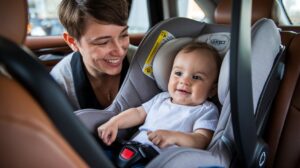Best Way to Find a Free Infant Car Seat for Low Income Families
Every new parent knows that an infant car seat is not just a luxury; it’s a necessity. For low-income families, securing one can be a real challenge. The safety of your little one shouldn’t depend on your income level. Fortunately, there are resources available to help ensure every baby has access to safe transportation. In this post, we’ll explore various programs and organizations dedicated to providing free or low-cost infant car seats for those who need them the most. Whether you’re seeking assistance through local community services or government initiatives like the WIC free car seat program, you’ll find valuable information here to guide you in giving your baby the safest ride possible. Let’s dive into how you can take advantage of these opportunities!
Government programs and organizations that offer free infant car seats
Many government programs and nonprofit organizations focus on ensuring the safety of infants traveling in vehicles. One notable initiative is the WIC free car seat program, part of the Women, Infants, and Children (WIC) Nutrition Program. This program assists low-income families by providing crucial resources for child safety.
Local health departments often collaborate with community organizations to provide free or discounted infant car seats. These partnerships aim to reduce barriers for families who may struggle financially.
Some hospitals also offer educational programs that include car seat distribution upon discharge after childbirth. They emphasize proper installation and usage as part of their commitment to infant safety.
Additionally, non-profit groups like Safe Kids Worldwide run campaigns aimed at increasing awareness about safe transportation practices while distributing car seats through local chapters. Families are encouraged to reach out and inquire about available options tailored specifically for them.
Qualifications and requirements for receiving a free infant car seat
To qualify for a free infant car seat, families often need to meet specific income guidelines. These criteria vary depending on the program or organization offering assistance.
Many programs prioritize low-income households, typically those earning at or below 185% of the federal poverty level. Proof of income may be required during the application process.
Additionally, some organizations will ask for proof of pregnancy or a newborn’s birth certificate. This ensures that the car seat is allocated to families who genuinely need it.
Participation in certain government programs can also establish eligibility. Programs like WIC are designed to support low-income families and may provide access to resources such as free car seats.
Completing safety training sessions might be necessary in some cases. Families are educated about proper installation and usage techniques to ensure maximum safety for their infants while traveling.
Tips for finding and applying for these programs
Start by researching local organizations. Many nonprofits, hospitals, and community health centers provide resources for low-income families. Reach out to them directly or check their websites.
Next, utilize online platforms. Websites like Baby2Baby and Safe Kids Worldwide often have information on programs offering free car seats.
When you find a program that interests you, gather necessary documents ahead of time. Proof of income and residency may be required during the application process.
Don’t hesitate to ask questions. Contact program staff for any clarifications regarding eligibility criteria or application procedures.
Stay organized throughout your search. Keep a checklist of different programs and their requirements to streamline the process.
Consider attending community events focused on family safety. They sometimes offer free car seats alongside educational workshops about child passenger safety.
Alternative options for obtaining a free or low-cost infant car seat
If government programs aren’t accessible, consider local nonprofits. Many charities provide assistance for families in need. They often have partnerships with businesses that donate car seats.
Local health departments may also offer resources. Some hold safety events where they distribute car seats and educate parents on proper usage.
Another option is community groups like churches or parenting organizations. These groups frequently run donation drives or can connect you with people looking to give away gently used items.
Don’t forget about online marketplaces and social media groups focused on parenting. Parents regularly sell or give away their old car seats at reduced prices, ensuring safe options are available without breaking the bank.
Check if any retailers near you have trade-in programs. This allows you to exchange an old seat for a discount on a new one while promoting safety awareness within your community.
The impact of having access to a safe car seat on low income families
Access to a safe car seat can dramatically change the lives of low-income families. It enhances safety during travel, reducing the risk of injury in case of an accident. Knowing their child is securely strapped in offers peace of mind.
Additionally, having a proper car seat opens doors for activities that require transportation. Families can attend medical appointments, job interviews, or educational programs without worrying about unsafe practices.
The emotional weight lifts when parents feel confident they are doing everything possible to protect their little ones. This sense of security fosters stronger family bonds and community ties as families navigate essential journeys together.
Moreover, children benefit from reliable transportation by gaining access to daycare or early education programs. These opportunities contribute to their development and future success while easing some burdens on parents  struggling with logistics and finances.
struggling with logistics and finances.
Conclusion
Access to a safe infant car seat is crucial for the well-being of both infants and their families. For low-income families, the financial burden of purchasing a car seat can be daunting. Fortunately, resources such as government programs and nonprofit organizations exist to help ease this burden.
By exploring options like the WIC free car seat program and understanding eligibility requirements, parents can secure essential safety equipment for their little ones. Additionally, discovering alternative sources—such as community programs or local charities—can further assist in acquiring a reliable car seat without breaking the bank.
The positive impact that having access to a safe car seat can have on low-income families cannot be overstated. It provides peace of mind during travel while ensuring compliance with safety regulations. Accessing these resources not only promotes child safety but also fosters confidence in navigating everyday life as parents.
With determination and resourcefulness, it’s possible for every family to provide their child with a safe start on life’s journey through effective transportation solutions.


